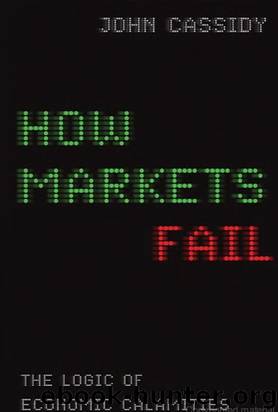How Markets Fail: The Logic of Economic Calamities by John Cassidy

Author:John Cassidy [Cassidy, John]
Language: eng
Format: epub
Tags: Non-Fiction
ISBN: 9781429990691
Google: 7Nji8Xl6KuYC
Amazon: B002VOGQRO
Publisher: Farrar, Straus and Giroux
Published: 2009-11-10T08:00:00+00:00
In 1977–1978, Kahneman and Tversky spent the academic year at Stanford, where they became friends and collaborators with Richard Thaler, a young economist who had done his Ph.D. at Rochester, a bastion of mathematical orthodoxy. During his graduate training, Thaler had developed a list of anecdotes that seemed to contradict the theory he’d been taught, such as people’s reluctance to part with minor possessions—mugs, pens, those sorts of things—and their tendency to divide their expenditures into separate mental accounts (one for leisure, another for rent, and so on). Thaler thought these types of behaviors might be linked to the mental shortcuts and biases that Kahneman and Tversky had identified. In 1980, he published a paper outlining some of his ideas in a reputable but somewhat obscure publication, The Journal of Economic Behavior and Organization, and in 1987 he began writing a regular column entitled “Anomalies,” in the much more influential Journal of Economic Perspectives. The latter series of articles introduced to the rest of the economics profession what would become known as behavioral economics.
In the past twenty years, the field has expanded in many directions. Led by pioneers such as Thaler, Colin Camerer of Caltech, and George Loewenstein of Carnegie Mellon, it has attracted some of the brightest young economists, such as Berkeley’s Matt Rabin, Harvard’s David Laibson, and MIT’s Esther Duflo. In the fast-growing field of behavioral finance, researchers have used the mental quirks that Kahneman and Tversky identified to help explain trend following, speculative bubbles, poor corporate decision-making, and many other phenomena that violate the efficient market hypothesis. The progress that behavioral finance has made is reflected in the fact that Thaler, once the enfant terrible of financial economics, is now a professor at the University of Chicago Booth School of Business. In 2002, Kahneman became the first non-economist to be awarded the Nobel Prize in Economics, which he shared with Vernon Smith, of George Mason University, who pioneered the use of economic experiments modeled on those used in experimental psychology. In announcing the prize, the Nobel committee said that Kahneman and Tversky’s work “inspired a new generation of researchers in economics and finance to enrich economic theory using insights from cognitive psychology into intrinsic human motivation.”
Often echoing the insights of Keynes and other economists of earlier generations, the best papers in behavioral economics start with a seemingly minor psychological quirk and examine how, in a competitive setting, it can scale up into a significant market failure. For example, Richard Roll, an economist at UCLA, addressed the growing popularity of corporate takeovers. Many empirical studies have shown that these arranged marriages rarely deliver the financial benefits that bidders hope to reap, but that hasn’t prevented ambitious CEOs from going ahead with them. In a paper entitled “The Hubris Hypothesis of Corporate Takeovers,” Roll suggested that overconfidence on the part of top executives was the driving force of many mergers; despite all the evidence to the contrary, CEOs kid themselves they are getting a bargain. “[T]he average individual bidder/manager has the opportunity to make only a few takeover offers during his career,” Roll wrote.
Download
This site does not store any files on its server. We only index and link to content provided by other sites. Please contact the content providers to delete copyright contents if any and email us, we'll remove relevant links or contents immediately.
International Integration of the Brazilian Economy by Elias C. Grivoyannis(111059)
The Radium Girls by Kate Moore(12028)
Turbulence by E. J. Noyes(8049)
Nudge - Improving Decisions about Health, Wealth, and Happiness by Thaler Sunstein(7706)
The Black Swan by Nassim Nicholas Taleb(7129)
Rich Dad Poor Dad by Robert T. Kiyosaki(6632)
Pioneering Portfolio Management by David F. Swensen(6300)
Man-made Catastrophes and Risk Information Concealment by Dmitry Chernov & Didier Sornette(6019)
Zero to One by Peter Thiel(5802)
Secrecy World by Jake Bernstein(4753)
Millionaire: The Philanderer, Gambler, and Duelist Who Invented Modern Finance by Janet Gleeson(4478)
The Age of Surveillance Capitalism by Shoshana Zuboff(4292)
Skin in the Game by Nassim Nicholas Taleb(4248)
The Money Culture by Michael Lewis(4207)
Bullshit Jobs by David Graeber(4190)
Skin in the Game: Hidden Asymmetries in Daily Life by Nassim Nicholas Taleb(4007)
The Dhandho Investor by Mohnish Pabrai(3765)
The Wisdom of Finance by Mihir Desai(3747)
Blockchain Basics by Daniel Drescher(3583)
